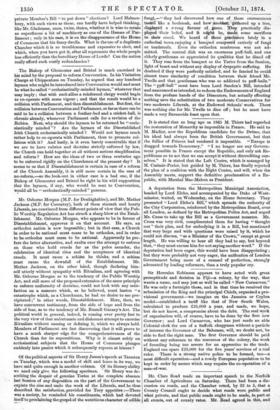Mr. Osborne Morgan (M.P. for Denbighshire), and Mr. Mather Jackson
(M.P. for Coventry), both of them staunch and hearty Liberals, are convinced from different points of view that the Pub- lic Worship Regulation Act has struck a sharp blow at the Estab- lishment. Mr. Osborne Morgan, who appears to be in favour of Disestablishment, approves it on that account. He aye, an orthodox nation is now impossible ; but in that case, a Church in order to be national must cease to be orthodox, and in order to be orthodox must cease to be national. Apparently he pre- fers the latter alternative, and exults over the attempt to enforce on those who hold creeds far as the poles asunder, the celebration of identical rites and the acceptance of identical creeds. It must cause a schithrt he thinks, and a schism must cause the downfall of the Establishment. Mr. Mather Jackson, on the other him- d, though declaring him- self utterly without sympathy with Ritualism, and agreeing with Mr. Osborne Morgan as to the tendency of the Public Worship Act, and still more of the proposed extension of the same principle to enforce uniformity of doctrine, could not look with any satis- faction on a measure which, as he believed, must hasten "a catastrophe which, as a Churchman, he had no desire to see pre- cipitated ;" in other words, Disestablishment. Here, then, we have concurrent testimony, from the side of hope and from the side of fear, as to the tendency of Mr. Russell Gurney's Act. The political world in general, indeed, is coming over pretty fast to the very view of that unfortunate and dishonest attempt to exorcise Ritualism without naming or defining it, which we always held. Members of Parliament are fast discovering that it will prove to have a much sharper edge for the comprehensiveness of the Church than for its superstitions. Why is it almost solely on ecclesiastical subjects that the House of Commons plunges suddenly into panics which it subsequently repents at leisure ?






































 Previous page
Previous page